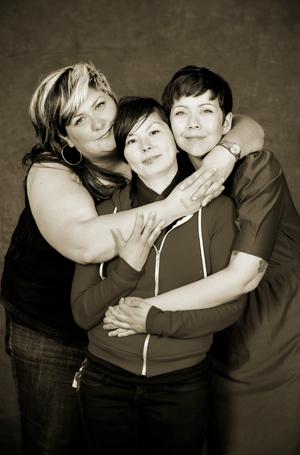This summer queer faces and stories will be made a permanent part of Vancouver’s urban landscape during the celebrations marking the city’s 125th anniversary.
Celebrate Queer Vancouver, presented by Out on Screen (which hosts Vancouver’s annual Queer Film Festival), is a month-long showcase of community discussion, film, performing arts and, at the hub of it all, an unveiling of public plaques featuring the photos and stories of eight queer families.
“Each plaque is going to feature what we call chosen family,” says Out on Screen program director Amber Dawn.
The aluminum signs will be installed on lampposts in Chinatown and the West End and on Commercial Dr and Granville St.
“There’s been an idea about doing public art for about four years now, with the idea of launching it this year,” Amber Dawn explains. “We did a project last year where we invited people to pose with their chosen family. We set up a mobile portrait studio where Sarah Race took photos and an audio journalist named Sarah Buchanan recorded their story.”
While Race and Buchanan documented 32 families, only eight were selected for the lampposts. All of the stories, sounds and images documented will be presented in full at the Queer Arts Festival launch on July 26 at the Roundhouse (see page 23).
Out on Screen hopes to use the signpost plaques to share the realities of queer people with the wider world. Amber Dawn says the stories were selected to highlight quotes that would communicate something very clear and powerful to the general public.
“We have a couple, for example, that’s been together for 25 years and got married in 2008. So you get to know a little about how that family is formed and their history as it pertains to local history, and Canadian history. With this family we can say that Canada was the fourth country to pass marriage equality. It’s a learning moment for the general public and for our community to be represented and have a public presence. It’s greater visibility.”
The project, which was funded by all three levels of government, will also make Out on Screen more accessible to people who might not otherwise participate in their events. “We’ll have a street presence, that’s the biggest thing,” says Amber Dawn. “The Queer Film Festival has traditionally been an indoor ticketed event, and now we’re venturing out into the public to places where it’s not only free but really easy to access.”
The endeavour builds upon the work done by Out in Schools, which has brought a queer presence into communities across British Columbia. “We do see, especially with the rise in the Out in School program, the successes we’ve had with taking queer film into high schools and starting conversations. Representation is a powerful tool in generating discussions, and we’ve seen it with Out in Schools and hope to see it in the general public with the plaques,” Amber Dawn says.
The municipal significance of the celebration is not lost on organizers, who note this year’s film festival will have a special focus on Vancouver. “At our film festival you’re going to see more Vancouver queer artists being celebrated,” says Amber Dawn. “There are a couple of programs including Vancouver Visionaries, a retrospective of queer short filmmaking in Vancouver that spans from the late 1970s to the present day.”

 Why you can trust Xtra
Why you can trust Xtra


